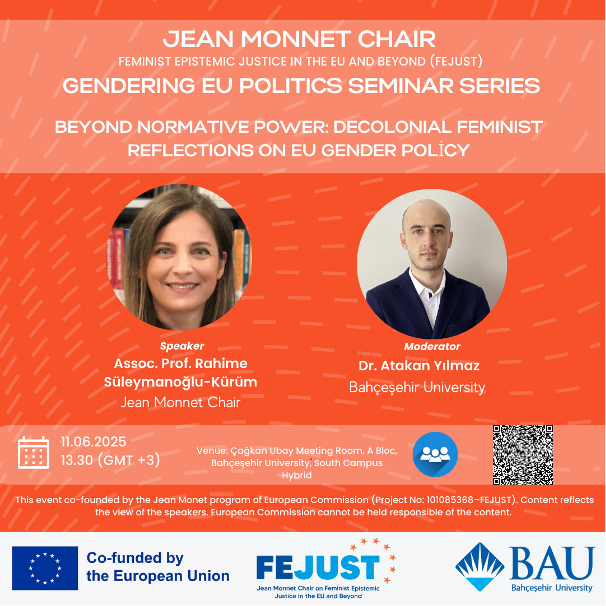Gendering EU Politics Seminar 12
Title: Beyond Normative Power: Decolonial Feminist Reflections on EU Gender Policy
Date: 11 June 2025, 13.30
Speaker: Rahime Süleymanoğlu-Kürüm, Jean Monnet Chair, BAU
Moderator: Dr. Atakan Yılmaz, Bahçeşehir University
Venue: Çağkan Ubay Meeting Room, A Bloc, Bahçeşehir University (hybrid-Teams)

This seminar engaged critically with the European Union’s approach to gender governance through the combined lenses of feminist epistemic justice and decolonial theory. Rahime Süleymanoğlu-Kürüm presented key insights from ongoing collaborative work with Melis Cin and Dimitrios Anagnostakis, arguing that while the EU often portrays itself as a normative power in the field of gender equality, its policies continue to reproduce epistemic hierarchies and colonial logics. The presentation highlighted conceptual tools such as “epistemic excavation” and thematic analysis to show how EU documents, policy frameworks, and civil-society reports can reveal patterns of instrumentalisation of gender equality, monopolisation of feminist knowledge, and neoliberal logics embedded in external action.
The event was characterised by lively discussion and debate, with participants reflecting on the scope and limits of decolonial critique in EU studies. Questions from the floor raised methodological challenges, including how to balance broad thematic coverage with depth, how to define a temporal window for analysis, and how to operationalise emerging concepts like epistemic containment and accountability. The diversity of perspectives in the room — from early-career researchers to senior scholars — contributed to a stimulating exchange that went beyond critique to consider how EU gender governance might be reimagined in more inclusive and transformative ways.
The seminar demonstrated the vibrancy of the Gendering EU Politics Seminar Series in fostering dialogue between feminist, decolonial, and critical EU scholars, and underscored FEJUST’s role in providing a platform where methodological innovation and epistemic pluralism can be debated openly.